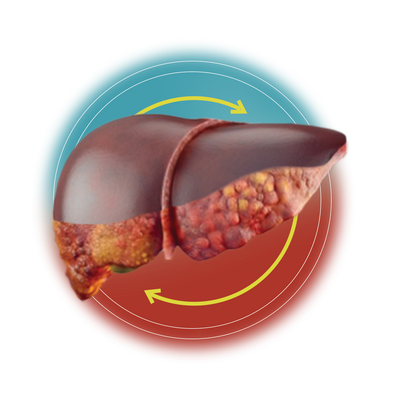alcoholic liver disease
Liver Transplants: A Life-Changing Surgery
The Plug Drink

The Plug Team

The liver is truly a miracle organ, but complications that can happen in the span of someone’s lifetime can affect the liver’s ability to function properly. Imperative to survival, a damaged or failing liver is fatal with nearly two million deaths worldwide attributed to liver disease (1). Thanks to the incredible advances in modern medicine, liver transplants are possible for individuals in need of functional livers, and in the year 2023 alone, over 10,000 liver transplants were performed in the United States (2).
Reasons for Liver Transplants

There are multiple reasons why a person may need a transplant, ranging from genetic predisposition to personal lifestyle choices (3); some common ones include:
● Alcoholic liver disease (ALD): A condition caused by excessive consumption of alcohol.
● Metabolic dysfunction-associated steatotic liver disease (MASLD): The build-up of fat in the liver not associated with alcohol consumption.
● Drug abuse: Taking more than the recommended amount of any drug, whether prescribed or over-the-counter, can cause great damage to the liver, causing acute liver failure.
● Genetic diseases: Hemochromatosis and Wilson’s disease are genetic disorders that cause an excessive buildup of iron and copper respectively in the body, which leads to damage to organs such as the liver.
● Hepatitis: An infection of the liver caused by coming into contact with bodily fluids from an infected individual, which often leads to cancer.
A majority of these conditions lead to cirrhosis (irreversible scarring of the liver), which is where damage to healthy cells impedes the liver's ability to regenerate. The build-up of scar tissue heavily affects major functions, which include breaking down and flushing out toxins.
Signs of Liver Failure
Since the liver is responsible for purging the body of toxins, a failing liver can have a very noticeable impact on the body. A major indicator of liver disease is jaundice, which is caused by a build-up of bilirubin in the bloodstream that leads to yellowing of the skin and eyes (4). Another big indicator is ascites, the swelling of the abdomen caused by build-up of fluid in the area often attributed to cirrhosis (5). Other general signs include fatigue, malaise, disorientation, nausea, and pain in the right side of the abdomen.
While these symptoms may not indicate the need for a liver transplant, they are certainly warning signs. There are steps that can be taken to improve liver health, such as improving diet and exercise habits, that can help return the liver to a functioning state or slow damage. It’s worth noting that genetics and chronic conditions play a large role in liver health, and for individuals with certain conditions, liver damage can be unavoidable. However, in the event that damage is too far gone or a disease is preventing liver recovery, a doctor will likely recommend proceeding with a transplant.
Complete vs. Partial Transplant

As with most transplants, the entire organ is typically taken from one patient and given to another. For a complete liver transplant, it must come from a recently deceased donor since humans cannot live without a functioning liver. However, there is a way for a living person to donate part of their liver thanks to its astonishing ability to regenerate! This means that a portion of a healthy person's liver can be introduced to someone else, and the healthy piece will replace the damaged area (3). Interestingly enough, a deceased donor's liver can even be split between two recipients for this exact reason (3).
Life After Transplant
Many go on to live healthy lives after receiving their transplant with 86% surviving past the first year and about 56% alive and well 20 years later (3). Most transplants are a success, but the first three months are hard on patients as their body needs to accept and adapt to the new liver (6). Recipients will need to take immunosuppressant medication for the rest of their lives to ensure their bodies do not reject the donated liver (6). Despite this, the spectacle of receiving a new organ in place of a failing one is truly an incredible feat in the field of medicine and has saved the lives of thousands.
Liver transplants stand as a beacon of hope for the countless individuals battling liver damage and failure. This procedure has saved lives and restored quality of life to thousands of people, and the advances in modern medicine continue to blow us away. Keep an eye on your liver health by visiting your doctor regularly as well as living a healthy lifestyle without unnecessary drug and alcohol intake. Being proactive towards your health can significantly reduce the risk of liver disease and ensure long-term well-being.

Here at The Plug, we know the importance of keeping your liver healthy. That’s why we crafted the perfect formula with plant-based ingredients proven to help heal your liver and body. Although organ transplants have come a long way in the medical field, it’s best to take care of your liver now and avoid complications later in life. Start your liver health journey with The Plug!
Bibliography
1. Asrani SK, Devarbhavi H, Eaton J, Kamath PS. Burden of liver diseases in the world. Journal of Hepatology [Internet]. 2019 Jan;70(1):151-171. Available from: https://pubmed.ncbi.nlm.nih.gov/30266282/
2. A decade of record increases in liver transplant [Internet]. United Network for Organ Sharing (UNOS). 2024 Feb 13. Available from: https://unos.org/news/in-focus/a-decade-of-record-increases-in-liver-transplant/
3. Definition & Facts of Liver Transplant [Internet]. National Institute of Diabetes and Digestive and Kidney Diseases. Available from: https://www.niddk.nih.gov/health-information/liver-disease/liver-transplant/definition-facts
4. Adult Jaundice [Internet]. Cleveland Clinic. Available from: https://my.clevelandclinic.org/health/symptoms/15367-adult-jaundice
5. Geng C. What to know about ascites (excess abdominal fluid) [Internet]. Medical News Today. Updated 2024 Feb 27. Available from: https://www.medicalnewstoday.com/articles/318775
6. FAQs About Life After Liver Transplant [Internet]. Columbia Surgery | Columbia University. Available from: https://columbiasurgery.org/liver/faqs-about-life-after-liver-transplant
